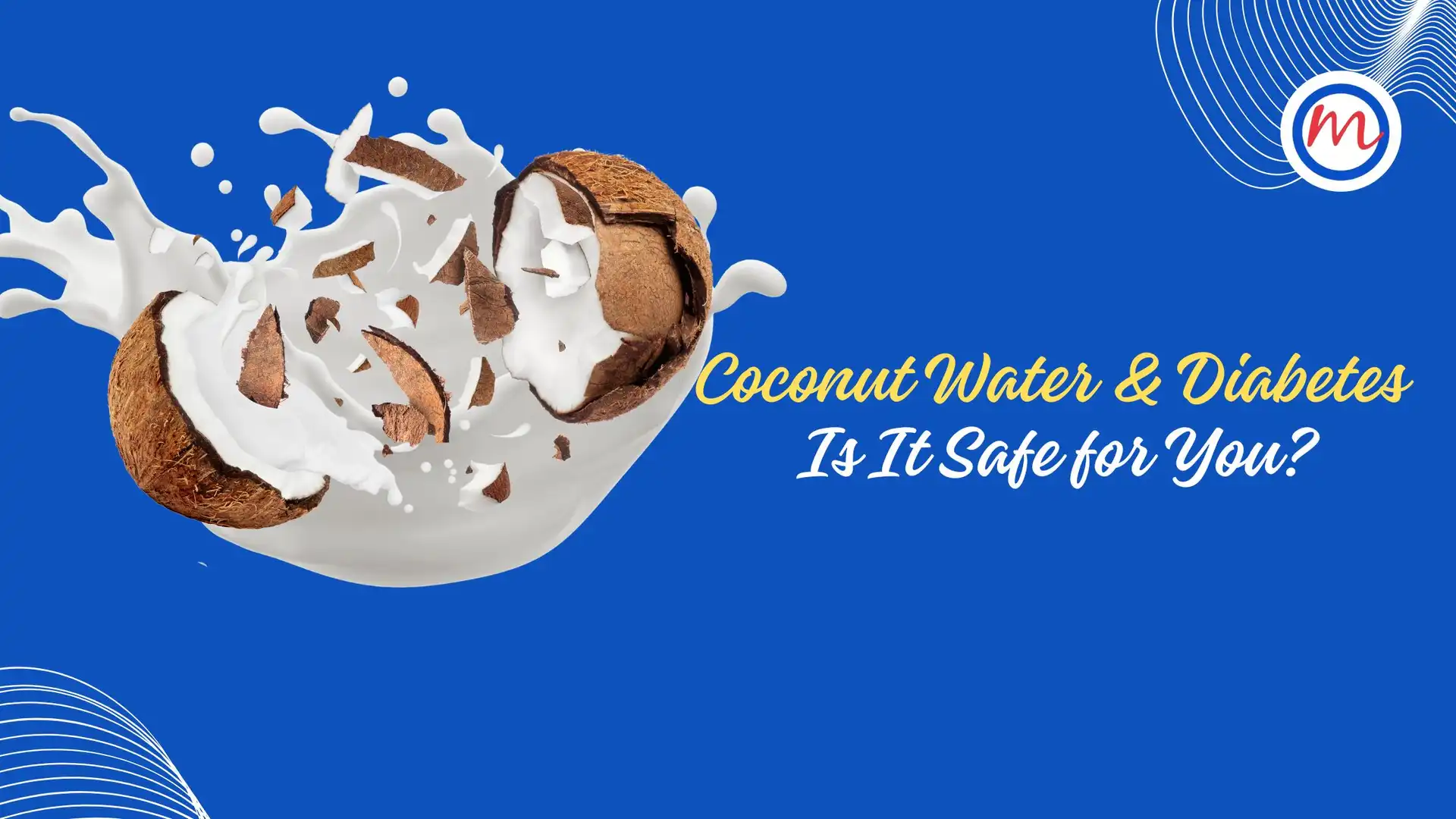Coconut Water & Diabetes: Is It Safe for You?
Coconut water, often called nature’s energy drink, is a staple in many Indian households. Known for its cooling effect and hydrating properties, it is widely consumed, especially in tropical regions like South India. But for individuals with diabetes, the question arises: Is coconut water a healthy choice? With its natural sweetness and essential nutrients, can people with diabetes safely enjoy this refreshing drink? Let’s explore how coconut water affects blood sugar levels and whether it fits into a diabetes-friendly diet.
What is Coconut Water and Its Nutritional Value?
Coconut water is the clear liquid inside young, green coconuts. Unlike coconut milk, which comes from the grated flesh, coconut water is naturally low in calories and fat-free. It contains vital electrolytes such as potassium, sodium, and magnesium, making it an excellent natural hydrator.
A 200ml serving of fresh coconut water contains approximately:
- Calories: 40-60 kcal
- Carbohydrates: 8-10g
- Natural Sugars: 6-8g
- Potassium: 250-600mg
- Magnesium, Sodium, and Antioxidants
Compared to sugary beverages and packaged fruit juices, coconut water is a far healthier choice. However, its sugar content still warrants careful consumption, especially for people with diabetes.
Effects of Coconut Water on Blood Sugar Levels
Coconut water has a low-to-moderate glycaemic index (GI), meaning it does not cause a rapid spike in blood sugar levels when consumed in moderation. However, the naturally occurring sugars in coconut water can impact glucose levels, depending on the quantity consumed.
Some potential benefits of coconut water for diabetes management include:
- Improved Insulin Sensitivity: Some studies suggest that coconut water may help improve insulin function, thereby aiding in blood sugar control.
- Hydration & Electrolyte Balance: For people with diabetes who frequently experience dehydration, especially during summer, coconut water provides essential hydration without added artificial sugars.
- Antioxidant Properties: Coconut water contains antioxidants that may help reduce oxidative stress, which is often linked to diabetes complications.
Despite these benefits, overconsumption can lead to excess sugar intake, affecting blood glucose levels. Thus, portion control is essential.
Scientific Research on Coconut Water and Diabetes
While research on coconut water in diabetes is still ongoing, some animal studies have shown promising results. A study conducted on diabetic rats suggested that coconut water improved glucose tolerance and insulin sensitivity. Additionally, its high potassium content supports heart health, a critical factor for individuals with diabetes who are at higher risk for cardiovascular diseases.
However, human studies are still limited, and more research is required to confirm these benefits conclusively. Consulting a doctor before making coconut water a regular part of your diet is advisable.
Benefits of Coconut Water for People with Diabetes
- Helps Manage Blood Pressure – Potassium in coconut water may help control blood pressure
- Boosts Digestion – Coconut water aids digestion
- Supports Kidney Health – It helps in flushing out toxins and may prevent kidney stones
- Acts as a Natural Coolant – Especially beneficial in Indian summers, it prevents dehydration and heat-related complications.
Risks and Precautions for People with Diabetes While Consuming Coconut Water
While coconut water offers numerous benefits, there are some precautions people should consider:
- Sugar Content Varies: The sugar content depends on the maturity of the coconut. Tender coconuts have less sugar than fully mature ones.
- Portion Control is Key: Limit intake to 100-150ml per day to avoid excessive sugar intake.
- Avoid Packaged Coconut Water: Many commercial brands add sugar and preservatives, making them unsuitable for people with diabetes.
- Monitor Blood Sugar Levels: If you are introducing coconut water into your diet, check your blood glucose levels to observe how your body reacts.
Best Ways to Consume Coconut Water
- Drink it Fresh: Opt for freshly sourced coconut water instead of bottled versions.
- Pair it with High-Fiber Foods: Combining coconut water with fibre-rich foods like chia seeds or nuts can slow down sugar absorption.
- Use it in Smoothies: Blend it with vegetables like spinach, cucumber, and a dash of lemon for a refreshing, diabetes-friendly drink.
- Limit Consumption to Mornings: Drinking it in the morning on an empty stomach can help with hydration and detoxification without spiking blood sugar significantly.
Alternative Hydrating Options for People with Diabetes
If you are looking for more hydrating options without raising blood sugar, consider:
- Buttermilk (Chaas) – A probiotic-rich alternative that aids digestion.
- Herbal Teas – Tulsi, cinnamon, and ginger teas offer health benefits without sugar.
- Infused Water – Water infused with mint, cucumber, or lemon provides flavour and hydration.
- Jeera (Cumin) Water – Known to aid digestion and blood sugar control.
Conclusion
Coconut water can be a refreshing and beneficial addition to a diabetic diet when consumed in moderation. Its rich electrolyte content, low glycaemic index, and potential insulin-sensitivity benefits make it a better alternative than sugary beverages. However, portion control is crucial to avoid unnecessary sugar intake.
By making informed choices and monitoring blood sugar levels, people with diabetes can enjoy coconut water safely while maintaining good health. Always consult a healthcare provider before making any dietary changes, and choose fresh coconut water over packaged varieties for maximum benefits.
Incorporating coconut water mindfully into a diabetes-friendly diet allows you to enjoy its natural goodness while keeping blood sugar levels in check.



